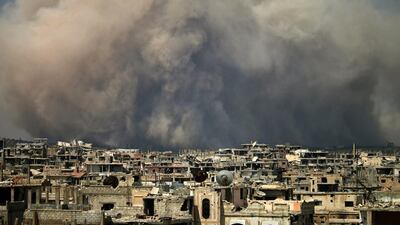Optimism following the US-led airstrikes on Syrian regime targets quickly gave way to realism. It is a road the world walked down last year when a chemical attack in Idlib prompted US President Donald Trump to strike a Syrian airbase in retaliation. That action ultimately failed to deter Bashar Al Assad's use of chemical weapons and led us right back to last weekend's strikes. Although a welcome intervention, the joint actions by the US, UK and France on Saturday were more restrained than many hoped and are unlikely to spur real change. They also seemed to exist without a broader plan in place to end this long and ruinous conflict. Undeterred, Mr Al Assad is expected to turn his attention to Idlib – the last pocket of rebel activity – where many more are likely to die by his sword. Far from resolving the protracted conflict or even charting a new course, the strikes have thickened the fault lines on which they were drawn. Mr Al Assad, who turned up for work on Saturday morning dressed in business attire and carrying a briefcase, claimed the attacks would only strengthen his determination. Again he looks impervious, shielded by his Russian and Iranian backers. And without crippling military action or a sustainable political solution, genuine change looks out of reach.
In a measured statement, the UAE's Ministry of Foreign Affairs and International Relations expressed support for the airstrikes and measures to eradicate Mr Al Assad's chemical arsenal, but rightly voiced concern about the prospect of escalating violence. While Mr Trump and his partners pursue a short-term deterrent, one which, unwittingly, seems to permit non-chemical warfare to carry on as normal, regional governments favour a political solution to end the wider crisis, adding even greater significance to the Arab League Summit in Saudi Arabia. Certainly, some of the answers to the bloodshed will need to be forged in this region.
_______________
Read more on Syria from The National Opinion:
The strikes in Syria need a long-term goal
_______________
That is easier said than done. Arab nations pursuing a peaceful resolution in Syria must overcome the antagonism of Iran, which supports the Assad regime as part of its regional destabilisation efforts. With no hint of irony, Iranian Supreme Leader Ayatollah Ali Khamenei accused the coalition of committing a “military crime” with its airstrikes. The situation is further complicated by the vortex of misinformation that today characterises the war. Damascus and Moscow continue to deny that chemical attacks took place. And while Mr Trump insisted the airstrikes had been “perfectly executed”, Russia claims 71 missiles were intercepted.
In 2013, then-US President Barack Obama drew a red-line over the use of chemical weapons, which Mr Al Assad quickly crossed. After last year's airbase strikes, the Syrian leader restarted his campaign of chemical attacks. After seven years, the conflict needs a rethink and Arab nations need to ensure they are central to the dialogue. With Palestine and Iran also on the agenda at the Arab League summit, the stakes could not be higher.

